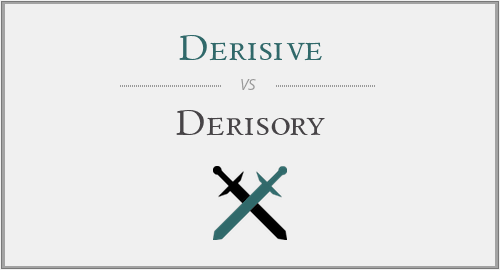Derisive vs. Derisory: Navigating Distinctions in Criticism
Understanding the differences between "derisive" and "derisory" involves recognizing variations in criticism and language. This article aims to clarify the distinctions between "derisive" and "derisory," shedding light on their meanings, applications, and appropriate usage in different contexts.
Correct Usage:
Derisive:
"Derisive" is an adjective used to describe expressions, remarks, or actions that mock, ridicule, or scorn someone or something. It conveys a sense of contemptuous or scornful criticism, often aimed at belittling or showing disdain. Derisive language or behavior may be intended to mock or express disapproval.
Derisory:
"Derisory" is an adjective used to describe something that is so inadequate or ridiculous that it deserves to be treated with contempt or mockery. It conveys a sense of absurdity or unworthiness, suggesting that the subject is deserving of scorn or considered laughably inadequate.
Meanings and Applications:
Derisive:
Use "derisive" when describing expressions or actions that mock or ridicule, expressing contempt or disdain. Derisive language may be used in criticism or disapproval, highlighting a sense of scornful mockery.
Derisory:
Use "derisory" when characterizing something as so inadequate or ridiculous that it deserves to be treated with contempt or mockery. "Derisory" emphasizes the laughable nature of something, suggesting that it is deserving of scorn due to its absurdity or lack of value.

Examples:
Correct: The audience responded with derisive laughter after the poorly delivered joke.
Correct: The proposal was met with derisory comments for its impracticality and lack of feasibility.
Contextual Considerations:
Consider the nature of the criticism and the intent when choosing between "derisive" and "derisory." "Derisive" focuses on mocking expressions, while "derisory" emphasizes the laughable inadequacy or unworthiness of something.
Conclusion:
Navigating the distinctions between "derisive" and "derisory" involves understanding their roles in conveying scorn or contempt. Whether describing mocking language or highlighting laughable inadequacy, using the appropriate term enhances precision and clarity in communication.








Have a discussion about this article with the community:
Report Comment
We're doing our best to make sure our content is useful, accurate and safe.
If by any chance you spot an inappropriate comment while navigating through our website please use this form to let us know, and we'll take care of it shortly.
Attachment
You need to be logged in to favorite.
Log In